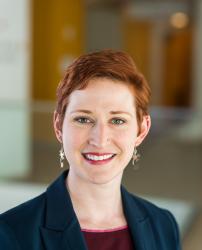Rachel Romeo

Member, Maryland Language Science Center
Assistant Professor, Department of Human Development and Quantitative Methodology
Assistant Professor, Department of Hearing and Speech Sciences
Director, Language, Experience, and Development (LEAD) lab
3304Q Benjamin Building
Get Directions
Education
Ph.D., Speech and Hearing Bioscience and Technology, Harvard University
Rachel Romeo, PhD, CCC-SLP (she/her/hers) is a developmental cognitive neuroscientist and licensed speech-language pathologist broadly interested in how children’s early experiences, both favorable and adverse, influence their neural, cognitive, and academic development, with a specific focus on language and literacy development. She directs the Language, Experience, and Development (LEAD) lab, where she employs interdisciplinary methods from developmental psychology, cognitive neuroscience (including structural and functional brain imaging), and direct educational interventions to study how young brains adapt to varying environments and lead to unique developmental paths. She is especially interested in socioeconomic differences in development, and how translational cognitive neuroscience may better support educational equity. Dr. Romeo’s research is funded by the National Institutes of Health, and has received international press by Scientific American, BBC, NPR, US News & World Report, and the World Economic Forum, amongst others.
Dr. Romeo received her PhD from the joint Harvard/MIT Program in Speech and Hearing Bioscience and Technology, MSc in Language Sciences from University College London, BA in Psychology and Linguistics from the University of Pennsylvania, and clinical licensure in Speech-Language Pathology from the MGH Institute of Health Professions. She also completed the Translational Postdoctoral Training in Neurodevelopment program at Boston Children's Hospital and Harvard Medical School.
Dr. Romeo's primary appointment is in the department of Human Development and Quantitative Methodology in the College of Education. She holds a courtesy appointment in the department of Hearing and Speech Sciences and is a faculty member in the Neuroscience and Cognitive Science Program. She is also a member of the Language Science Center, the Field Committee in Developmental Science, the Brain Behavior Institute, and the Maryland Neuroimaging Center.
Publications
Parenting relationships as a moderator of how socioeconomic status and household chaos relate to children’s cognitive and socioemotional skills
How low SES and household chaos impact children, and if positive parenting can help.
Contributor(s): Sharon Alexa McDorman, Ellie Taylor, Rachel RomeoNon-ARHU Contributor(s): Morgan A. Gilmer, Victoria A. Terry, John D. Gabrieli
This study explores how low socioeconomic status (SES) and household chaos (considered negative childhood experiences) can impact important skills like executive functioning (EF) and socioemotional (SE) development in children. It also looks at whether positive experiences, specifically strong parenting relationships, can help alleviate the negative effects of these challenges. The research involved 83 children, ages 4 to 7, from diverse backgrounds.
The findings show that SES was linked to children’s lab-based EF skills, while household chaos seemed to affect their socioemotional development, with parenting playing a big role in that connection. However, the study didn’t find strong evidence that parenting could protect against the negative effects of SES and chaos on either EF or SE skills. Still, it did find that positive parenting was more closely related to better survey-based EF and SE skills in kids. This suggests that focusing on improving parenting relationships could be key to helping children thrive, even in difficult circumstances.

